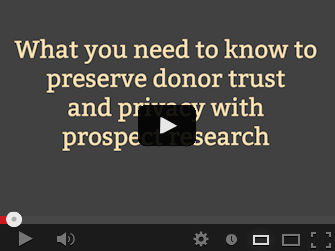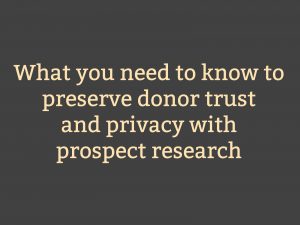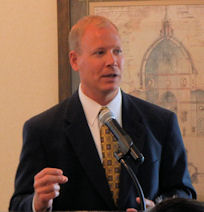 Whether it’s a personal story or a media headline, we’ve all heard of incidents where data was mishandled or misunderstood and donors felt betrayed. And yet, many development and advancement offices continue to place little value on their information and data.
Whether it’s a personal story or a media headline, we’ve all heard of incidents where data was mishandled or misunderstood and donors felt betrayed. And yet, many development and advancement offices continue to place little value on their information and data.If you are in the development or fundraising office, you are in a position to begin changing the culture of respect and trust toward your organization’s data.
- Data Management: Prospect Research Professionals are uniquely positioned to research and be a part of the team creating information management policies that ensure your data is used and maintained effectively. This is the era of Big Data and your researcher is versed in mining the gold from it.
- Data Protection:The more important data becomes, the higher the risk that it will be breached and erode your donors’ faith in your organization’s ability to protect their information. Your prospect research professional is your trusted guide, helping you to navigate and translate vendor and IT products and jargon. S/he is also the voice helping you to create different levels of data access, such as who can print profiles, with how much information in them, and do what with them.
- Non-Traditional Donors: We’ve been using wealth screenings effectively, but it’s time to recognize that this identification method is limited. Encourage your researcher to work with you to identify non-traditional indicators of wealth. That means conversations, but it also means assigning and actively pursuing those minority prospects, too. If there is wealth there, why are you ignoring them?
- Relationship Mapping: This is a broad term for what requires a great deal of sweat equity, but software is inching forward to make it better and faster. Understanding the relationships among your major gift donors could be a healthy disruption to your usual processes. Understanding and learning to leverage the power of your other donor groups’ relationships could transform your organization’s fundraising reach! If you are not building the capacity for fundraising analytics to discover patterns such as these relationships, you will be left behind.
- Persuade with Data: Yes, you can work with your prospect research professional to illustrate the data that answers questions and use this to persuade donors to give. Infographics are particularly popular. But let’s use data to put a stop to fickle fundraising. How many times do you change strategies based on “I feel” or “s/he said” or “they say”? Use your prospect research professional’s analytical prowess to methodically gather data of all kinds to help leadership form a strategy it can stick to – and win. Jason Briggs outlines this brilliantly in his article on international research.
More Resources You Might Like
Privacy and Prospect Research Video
- APRA Ethics and Professional Standards
- Can you really trust prospect research? 10 things you should know | Jen Filla
- Fundraising + Science = ? | Jen Filla

 Can you imagine if that headline was about you? How would that impact your organization and your fundraising career? Would it be fatal or a blip in the radar?
Can you imagine if that headline was about you? How would that impact your organization and your fundraising career? Would it be fatal or a blip in the radar?





